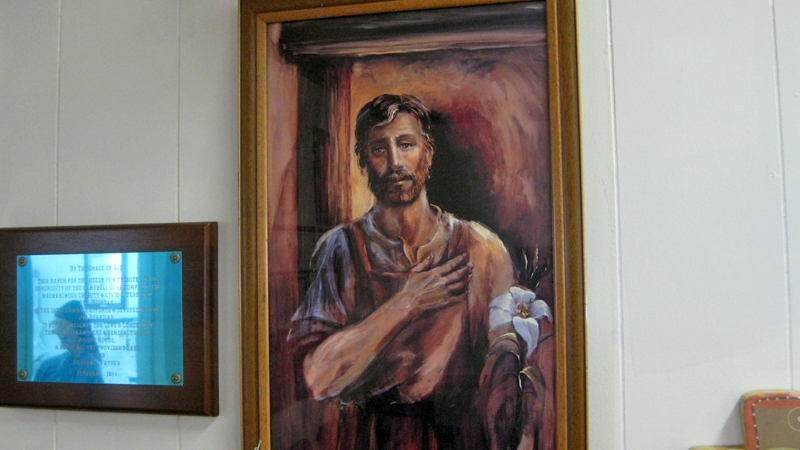The Year of St. Joseph

Years ago, in December of 1964, our founder Sr. Mary Elizabeth was at a turning point in her life. Unsure of her next move, she decided to make a pilgrimage to St. Joseph’s Oratory in Montreal, the largest shrine in the world dedicated to St. Joseph. She went there to have a heart-to-heart talk with the shrine’s namesake. Sr. Mary Elizabeth believed she had a calling from God, “a call within a call,” to begin a new mission of service to the poor. The problem was, she was alone and had absolutely nothing. How could she do what was being asked of her? She needed help.
So she went to St. Joseph, the carpenter from Nazareth, the one chosen by God to love and care for Jesus and His mother Mary, the one who protected them from danger, established a home for them and provided for their needs. She entrusted to St. Joseph all of her hopes and dreams, the desires of her heart that we’re waiting to be fulfilled. After spending long hours in prayer, she left the shrine and returned to Baltimore. She had a few ideas about the next steps to take, and confidence that she wasn’t really alone. Within a year she started the Joseph House ministry.
Now in December of 2020, in the midst of a pandemic that has caused suffering across the globe, Pope Francis is asking all the faithful to “Go to Joseph” (Gen 41:55). To highlight the unique importance of this saint, the Pope recently announced a “Year of St. Joseph,” extending from December 8, 2020 to December 8, 2021.
The purpose of this year is to encourage the faithful to learn from and follow the example of this beloved saint. In so doing, according to the official decree, people may find “with the help of St. Joseph, head of the heavenly Family of Nazareth, comfort and relief from the serious human and social tribulations which today afflict the contemporary world.”
To coincide with this “Year of St. Joseph,” Pope Francis has written an Apostolic Letter entitled Patris Corde (“With a Father’s Heart”), which refers to “how Joseph loved Jesus, whom all four Gospels refer to as ‘the son of Joseph.’”
The Letter presents a personal and prayerful look at the life and actions of St. Joseph in the Gospels. Special emphasis is given to Joseph’s role as a father, with Pope Francis describing him as a beloved, tender and loving, obedient, accepting, creatively courageous, and working father, as well as a father in the shadows.
The entire Letter is worth reading. Here is the link for the online text of Patris Corde:
http://www.vatican.va/content/francesco/en/apost_letters/documents/papa-francesco-lettera-ap_20201208_patris-corde.html
Below are a few noteworthy passages:
“I would like to share some personal reflections on this extraordinary figure, so close to our own human experience. For, as Jesus says, ‘out of the abundance of the heart the mouth speaks’ (Mt 12:34). My desire to do so increased during these months of pandemic, when we experienced, amid the crisis, how ‘our lives are woven together and sustained by ordinary people, people often overlooked. People who do not appear in newspaper and magazine headlines, or on the latest television show, yet in these very days are surely shaping the decisive events of our history. Doctors, nurses, storekeepers and supermarket workers, cleaning personnel, caregivers, transport workers, men and women working to provide essential services and public safety, volunteers, priests, men and women religious, and so very many others. They understood that no one is saved alone.’”
“How many people daily exercise patience and offer hope, taking care to spread not panic, but shared responsibility. How many fathers, mothers, grandparents and teachers are showing our children, in small everyday ways, how to accept and deal with a crisis by adjusting their routines, looking ahead and encouraging the practice of prayer. How many are praying, making sacrifices and interceding for the good of all.”
“Each of us can discover in Joseph – the man who goes unnoticed, a daily, discreet and hidden presence – an intercessor, a support and a guide in times of trouble. Saint Joseph reminds us that those who appear hidden or in the shadows can play an incomparable role in the history of salvation. A word of recognition and of gratitude is due to them all.”

“Even through Joseph’s fears, God’s will, his history and his plan were at work. Joseph, then, teaches us that faith in God includes believing that he can work even through our fears, our frailties and our weaknesses. He also teaches us that amid the tempests of life, we must never be afraid to let the Lord steer our course. At times, we want to be in complete control, yet God always sees the bigger picture.”
“Nor should we ever think that believing means finding facile and comforting solutions. The faith Christ taught us is what we see in Saint Joseph. He did not look for shortcuts, but confronted reality with open eyes and accepted personal responsibility for it.”
“Just as God told Joseph: ‘Son of David, do not be afraid!’ (Mt 1:20), so he seems to tell us: ‘Do not be afraid!’ We need to set aside all anger and disappointment, and to embrace the way things are, even when they do not turn out as we wish. Not with mere resignation but with hope and courage. In this way, we become open to a deeper meaning. Our lives can be miraculously reborn if we find the courage to live them in accordance with the Gospel. It does not matter if everything seems to have gone wrong or some things can no longer be fixed. God can make flowers spring up from stony ground. Even if our heart condemns us, ‘God is greater than our hearts, and he knows everything’ (1 Jn 3:20).”
“Working persons, whatever their job may be, are cooperating with God himself, and in some way become creators of the world around us. The crisis of our time, which is economic, social, cultural and spiritual, can serve as a summons for all of us to rediscover the value, the importance and necessity of work for bringing about a new ‘normal’ from which no one is excluded.”
“Fathers are not born, but made. A man does not become a father simply by bringing a child into the world, but by taking up the responsibility to care for that child. Whenever a man accepts responsibility for the life of another, in some way he becomes a father to that person.”
“Our world today needs fathers. It has no use for tyrants who would domineer others as a means of compensating for their own needs. It rejects those who confuse authority with authoritarianism, service with servility, discussion with oppression, charity with a welfare mentality, power with destruction.”
“The aim of this Apostolic Letter is to increase our love for this great saint, to encourage us to implore his intercession and to imitate his virtues and his zeal. Indeed, the proper mission of the saints is not only to obtain miracles and graces, but to intercede for us before God, like Abraham and Moses, and like Jesus, the ‘one mediator’ (1 Tim 2:5), who is our ‘advocate’ with the Father (1 Jn 2:1) and who ‘always lives to make intercession for [us]’ (Heb 7:25; cf. Rom 8:34). The saints help all the faithful ‘to strive for the holiness and the perfection of their particular state of life.’ Their lives are concrete proof that it is possible to put the Gospel into practice.”
The journey that Sr. Mary Elizabeth made in 1964 was an expression of her determination and faith. The shrine sits high above Montreal and one must climb many steps to reach it. But as it is in life, each step brought her closer to the goal.
It has been a hard year for everyone, and many people are feeling worn out and exhausted. The steps seem never-ending. Even if we feel like there is no one beside us, we can always reach out to St. Joseph. He will help us obtain the graces we need.
Our ministry is named after St. Joseph. We depend on his help all the time. The “Year of St. Joseph” is a blessing for the world, and we encourage everyone to spend some time getting acquainted with this trustworthy saint.
P.S. St. Joseph’s Oratory in Montreal is beautiful. Here is the link for the website to make a virtual visit: https://www.saint-joseph.org/en/
